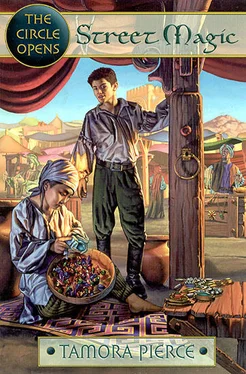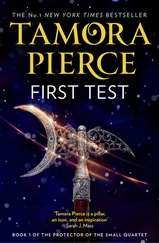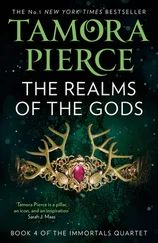He particularly suspected those young men and women who were his age or just a bit older. A number of them sported a small yellow metal nose ring from which hung a roughly shaped garnet the size of a pomegranate seed. Still others wore a distinctive costume, white tunic over black breeches or skirts. The jewelry was high-priced for a gang mark—Briar’s old gang had just wound a strip of blue cloth around their biceps—but the nose ring and pendant looked like a gang mark all the same, and the black and white clothes had to be gang colors. He wasn’t surprised to find more than one gang here— souks were traditionally grounds where gangs roamed under truce.
He came to a long aisle where those who peddled semiprecious stones sold their wares. Here the crowd was thicker: more people could afford carnelian and amethysts than pearls. That was particularly true of the local mages, hedgewitches, and healers. Only rich mages could afford to use pearls and rubies in their work, but even students could find moonstones or mother-of-pearl discs that would be acceptable substitutes in their spells.
Briar was looking at a basket of malachite pieces, wondering if they might anchor the magic in his miniature trees, when a flicker of light caught his eye. He turned, scanning the aisle. This time the light came as a dart of silver in a stall across from him. Briar knew that particular fire well. Few mages could actually see magic as he did; no one who was not a mage would even notice it. Curious, he sauntered over for a look.
Now, here’s something , he thought as he drew near. The stall’s owner, a barrel-chested man, perched on a stool among his baskets and bowls of stones. Beside him a scruffy-looking girl picked through a bowl of tiger-eye pieces, polishing selected ones with a cloth and setting them aside in a round basket. As she rubbed, silver light flowered, then faded to ember-strength, in the pieces she handled. Briar also saw that the guard who stood watch between this stall and its neighbor kept his eyes on the traffic, not on the girl, though the owner never took his eyes off her. She was known, then, or she wouldn’t have been allowed to stop for half a breath within reaching distance of the stall.
This man sold a bit of everything. Briar identified jade, amber, moonstone, onyx, lapis lazuli, jet, malachite, and carnelian before his knowledge of stones ran out. Now that he was looking closely at the wares, he could see a row of small baskets like the one in which the girl put her polished stones on a shelf beside the stall’s owner. Those stones all showed a seed of silver to Briar’s magical vision.
“Say, kid, how do you do it?” Briar asked, his curiosity getting the better of him. “Make their magic light up like that?”
The girl spun to face him, as wary as a wild animal. She was a foot shorter than Briar’s five feet seven inches, and she looked to be nine or ten. A skinny waif, she had the bronze-colored skin and almond-shaped brown eyes of a Yanjing native. Wisps of black hair stuck out from under the dirty scarf wrapped around her head. She wore a long tunic and trousers of unguessable color, aged and speckled with holes. Even though it was autumn, she was barefoot.
“It’s all right,” Briar assured her cheerfully. “I’m a mage myself. Are you calling to magic already in them, or are you just laying a charm on them?”
The girl put down her basket and cloth. She smiled just as cheerfully as Briar had—and ran.
He stared after her, baffled. “What did I say?” he asked the stall’s guard. The man ignored him still, watching passersby in the aisle.
The stall’s owner left his stool to walk over to Briar. He was short, his body powerfully muscled under his rich silk tunic and draped satin trousers. His skin was a little darker than Briar’s, his hair and eyes black. Briar figured him for a westerner, since he didn’t wear the turban preferred by eastern men. “What did you run her off for?” the man demanded sharply. “Evvy’s no thief.”
“You said something,” argued the stall’s owner. “Now look. She’d barely started.”
“What’s she do here?” Briar asked, curious. “What’s her name? ‘Evvy,’ you said?”
The owner shrugged, not quite meeting Briar’s eyes. “She’s just a street kid,” he replied. The word for baby goat was slang for a child in Briar’s native Imperial as well as in Chammuri. “She polishes some of my pieces, and I throw her a few coppers.”
“Then he triples the price and sells them to the mage trade,” the shopkeeper across the aisle called, his voice waspish. He was seated at a bench as he worked on jewelry. “Just because he realized the ones she handles sell quicker.”
“He spoke of magic, Nahim Zineer,” the sharp-voiced man retorted, pointing at Briar. The boy glanced at the awning overhead: gold embroidered letters read NAHIM ZINEER: CRYSTALS, PRECIOUS, AND SEMIPRECIOUS STONES.
“If she’s a mage, what’s she doing living in some Oldtown cave like an animal?” Nahim demanded, glaring at the jeweler. “She’s just got a hand with cleaning stones, that’s all.” To Briar he said, “And I’d appreciate it if you wouldn’t frighten her off again.”
“At least not until she’s done all the baskets,” quipped his neighbor.
Briar wandered off, shaking his head. It was possible the girl might not know of her gift. Some magic hid in most things, waiting for a mage with the right power to call it forth. That had been the case with Briar and the three girls who had shared a house with him at Winding Circle temple in Summersea. None of the four had shown the traditional signs of magical power, but all their lives they had been fascinated by particular ordinary things, things they later discovered were magically bound to them. In Briar’s case his magic had drawn him to plants. Only at Winding Circle, under the supervision of four extraordinary mage-teachers, had he and the girls learned about their unusual magics, and the ways they could be used. What if there was no one like Niklaren Goldeye, the mage who had seen Briar’s magic and taken him to Winding Circle, in Chammur? This girl might never be trained in the use of her power. Worse, if it broke away from her—as magic often did when its bearer could not control it—she would find herself in real trouble.
Briar was so lost in thought that he didn’t realize he had attracted companions until two youths slid up on either side of him. Two more oozed out of the crowds ahead to block his advance. If Briar had cared to gamble he would have bet there were two more behind him. All of the ones he could see wore the yellow metal nose ring and garnet drop; all moved together without discussion. They nudged him to one side, trying to direct him down a dimly lit aisle. Briar stopped. There was no telling what they’d do in some dark niche. He had no intention of finding out. He saw no weapons, but that meant nothing: he carried nine. Theirs were probably tucked in the same places that his were. They were barefoot or in sandals, so at least they had no boot knives, and he did.
The ties that kept his wrist knives in their sheaths were twisted hemp. They came undone at his command, letting the hilts slip down into his palms. “You kids run along and play,” he told the youths in heavily accented Chammuri. “I’m just minding my own business.”
One of them, a short black youth, crossed his arms over his chest. “You’re on Viper ground, eknub” —foreigner.
“You got me wrong.” Briar met the speaker’s eyes. “I’m not in your business.” His tongue fumbled with the unfamiliar Chammuri words. He hoped they meant the same things they did in the west. “I’m just shopping. Besides, souks are free zones. You can’t claim them for territory.”
Читать дальше












